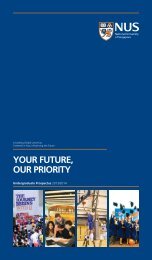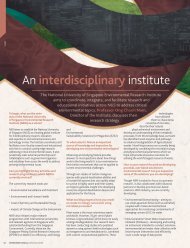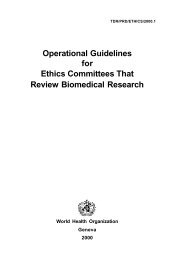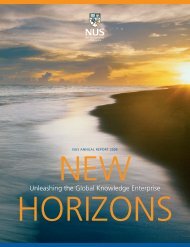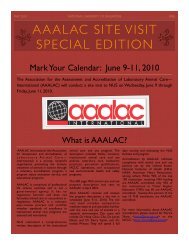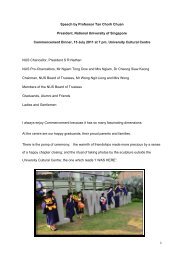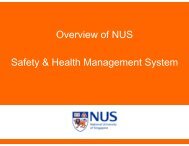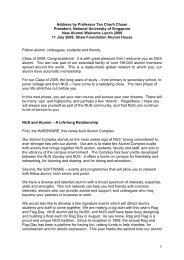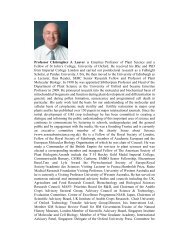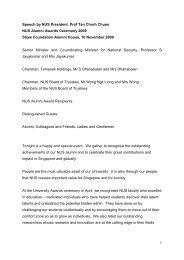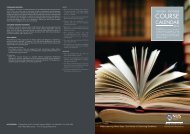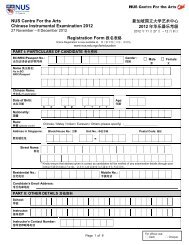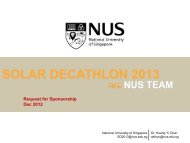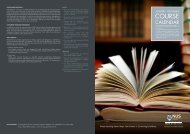Report - NUS - Home
Report - NUS - Home
Report - NUS - Home
Create successful ePaper yourself
Turn your PDF publications into a flip-book with our unique Google optimized e-Paper software.
Asia Vision 21<br />
Singapore • April 29 - May 1, 2010<br />
Harvard University<br />
Asia Center<br />
Harvard University Asia Center
Asia Vision 21<br />
Singapore • April 29 - May 1, 2010<br />
Values, Conflicts, and Change in Asia<br />
The Harvard University Asia Center gratefully acknowledges the sponsors of Asia Vision 21:<br />
The Akatsuka Group<br />
Anonymous donors<br />
The Asia Foundation<br />
Dr. Henry Cheng<br />
Mr. Lee M. Folger<br />
The Himalaya Foundation<br />
The Houghton Freeman Foundation<br />
The Victor and William Fung Foundation<br />
The Hsin Yi Foundation<br />
Kim & Chang<br />
Korea Chamber of Commerce and Industry<br />
Korea Development Institute<br />
Korea Institute for International Economic Policy<br />
Dr. Peter Kwok<br />
Mr. Raymond Kwok<br />
Dr. Kin-chung Lam<br />
Mr. Jimmy Y.C. Lee<br />
The Lee Foundation<br />
Lombard Investments, Inc.<br />
Samsung Economic Research Institute<br />
Seoul Broadcasting System<br />
Tsuzuki Sogo Gakuen<br />
Mr. Wenliang Wang<br />
The Wu Foundation
Values, Conflicts, and Change in Asia<br />
Singapore • April 29 - May 1, 2010<br />
Executive Summary<br />
The annual Asia Vision 21 conference was held this year in Singapore, April 29 to May 1, 2010, and cosponsored by<br />
the Asia Center and the Rajawali Foundation Institute for Asia at Harvard University and the Lee Kuan Yew School<br />
and the Office of the Deputy President at the National University of Singapore. More than 90 scholars, businessmen,<br />
government officials, policymakers, public intellectuals, and other professionals from sixteen countries met to discuss<br />
long-term trends and potential outcomes for the economies and societies of Asia.<br />
The broad themes of values, conflicts, and change in Asia were discussed in light of fundamental transformations taking<br />
place in social life in the region. For example, the 2008-09 global financial and economic crises produced questions<br />
in the minds of leaders and populations concerning the viability of capitalism. What is the appropriate balance for<br />
financial actors and institutions in regards to opportunities, risks, and responsibilities? What is the proper role of<br />
businesses in human security? How do we address the tension between financial or economic short term needs and<br />
long term goals? How do we devise a new set of values in the face of technological and scientific changes that call into<br />
question or weaken long held traditions and accepted cultural standards? These themes and questions were addressed in<br />
conference discussions on specific topics that ranged from global financial imbalances to biotech models for economic<br />
development to governance and stability in Asia, from regional considerations and perspectives to security challenges<br />
to Asian Islam, and more.<br />
Some of the speakers and participants at the conference pointed to basic integrating and common human values that<br />
concern individuals and groups in the region as a way to understand an environment of increasing complexities and<br />
rapid changes. Their discussions also dealt with the growing contrast between operational values in daily lives and moral<br />
and ethical beliefs across societies. Others addressed rising nationalism, religious fundamentalism, uncertainties about<br />
the rise of Asia, shifting balances of power, U.S. adjustments in the region, regional flashpoints, conflict prevention, and<br />
promoting innovation as issues of concern, consideration, and action where appropriate and wise. The following pages<br />
outline at greater length the words and thoughts of the keynote speakers, featured presenters, and invited participants<br />
in the 2010 Asia Vision 21 conference.
Session 1:<br />
Asia’s Role in Addressing<br />
Global Imbalances<br />
Moderator Dwight Perkins, Harvard University,<br />
opened the first panel session by questioning the role<br />
of global imbalances in the current financial crisis.<br />
Comparing the debt crisis of the 1980s to the 2008-2009<br />
financial crisis, he argued that flows of ready cash between<br />
wealthy OPEC countries and poorer Latin American<br />
nations were significant factors in the former. In the latter<br />
situation, however, a global case of false confidence in<br />
the U.S. market seems to have occurred independent of<br />
extant economic imbalances. Perkins invited the panel’s<br />
participants to help explain and clarify the relationship<br />
between these imbalances and the current crisis.<br />
Turning to the topic of imbalances themselves, Perkins<br />
highlighted one of the most prominent: the deficits of<br />
the U.S. and the surpluses of China. Disagreeing with<br />
Fred Bergsten’s argument that China has essentially<br />
been exporting unemployment through its undervalued<br />
exchange rate and that currency revaluation would help to<br />
correct the situation, Perkins sees the current imbalances<br />
in the U.S. and China as rooted in differences in savings<br />
behavior and that revaluation of the Renminbi (RMB)<br />
would do little to mitigate the imbalance. He criticized<br />
the proposition that increased spending by Chinese<br />
households would significantly change the situation and<br />
suggested instead that American overspending – propelled<br />
by Bush-era tax cuts – was at the heart of the matter.<br />
Pumping money into the U.S. economy may have stopped<br />
its complete collapse, but the unintended result has been<br />
a growing disparity between the U.S. and its international<br />
partners, like China.<br />
Panelist Gang Fan, China Reform Foundation,<br />
challenged the common conception of China as the<br />
heaviest weight on the scale of global imbalance. He<br />
argued that the Middle East, not China, is actually the top<br />
Hiroshi Watanbe, Tharman Shanmugaratnam, Dwight Perkins,<br />
Gang Fan & Shekar Gupta<br />
accumulator of reserves and that the greatest factor in<br />
global imbalance is not the high savings rate of countries<br />
like China, but widespread overconsumption. Fan further<br />
argued that domestic imbalances were key factors in<br />
perpetuating international imbalances; he suggested that<br />
countries focus on correcting internal disparities before<br />
contributing to solutions for global imbalances.<br />
In China, for example, savings are too high, wages are<br />
too low, too much income goes towards capital returns,<br />
and corporate profits are too high relative to the GDP.<br />
Institutional problems, such as a large state sector, and<br />
problems with the social safety net, exacerbate the<br />
situation. Furthermore, Chinese household savings are<br />
no longer as high as they once were; rates have actually<br />
stabilized at about 30%, and the majority of savings<br />
actually comes from the corporate sector. Corporate<br />
savings are also falling, but Fan ultimately questioned<br />
whether such decreases in savings rates would necessarily<br />
contribute to the relief of global imbalances.<br />
Referencing the session title, panelist Shekhar Gupta,<br />
The India Express, questioned the way in which “Asia” is<br />
defined in discussions of global imbalance. To Gupta, the<br />
Asia Vision 21 Spring 2010 Singapore 1
tendency to reference only East Asia or all Asia speaks to<br />
another kind of imbalance, which could be ameliorated<br />
by inclusion of South and Southeast Asian countries in<br />
discussions of global issues. Specifically noting the under<br />
representation of India, he argued for the importance of<br />
its sustained 8% growth over a period of four years.<br />
Gupta discussed intraregional diversity and ideological<br />
divides among Asian countries, but ultimately argued that<br />
there is a need for greater unity among Asian countries,<br />
the assumption of more responsibility on global issues like<br />
climate change, and the creation of stronger institutions.<br />
He suggested that the next big question regarding Asia<br />
and its role in global imbalances is in fact one of power<br />
imbalance. Given that many of the world’s rising powers<br />
– India, China, Indonesia, even Bangladesh – are in Asia,<br />
the entire global architecture of power may need to shift<br />
to accommodate these new key players.<br />
Panelist Hiroshi Watanabe, Japan Bank for<br />
International Cooperation, began his presentation by<br />
identifying two categories of global imbalance: (1) trade<br />
and commodities, and (2) finance and capital. Like<br />
Perkins and Fan, Watanabe cited overconsumption as a<br />
major cause of imbalance. In particular, there is a need for<br />
the U.S. to stymie overconsumption by removing inflated<br />
incentives to borrow and increasing savings. In particular,<br />
the U.S. should stymie overconsumption by removing<br />
inflated incentives to borrow, and it should increase<br />
savings. For China, Watanabe suggested that the RMB<br />
should be revalued to reflect the strength of the economy,<br />
but cautioned that this would not serve as a panacea for<br />
U.S.-China trade imbalances due to the persistence of<br />
underlying problems in U.S. manufacturing. China, too,<br />
must correct internal instabilities through measures<br />
such as ensuring more appropriate income distribution,<br />
increasing consumption in the agricultural sector, and<br />
improving tax policies.<br />
In relation to finance and capital, Watanabe framed<br />
Asia as a major source of global capital and savings.<br />
While savings currently flow through U.S. and European<br />
financial markets, Watanabe suggested that the money<br />
would be better spent within the Asian region. Citing<br />
efforts by co-panelist Tharman Shanmugaratnam,<br />
Watanabe praised ASEAN+3 initiatives that encourage<br />
intraregional economic cooperation.<br />
In the final presentation of the first session, Tharman<br />
Shanmugaratnam, Minister for Finance, Singapore,<br />
linked global balance to the larger purpose of sustaining<br />
growth at socially acceptable levels. Shanmugaratnam felt<br />
that sustained growth in both the emerging markets and<br />
new sources of growth in developed economies were in<br />
everyone’s interests. In this regard, he argued that the new<br />
conventional wisdom that called for Asian economies to<br />
shift away from export-driven economic development<br />
was short-sighted. Their rates of potential output growth<br />
ultimately rested on their catch-up in productivity levels,<br />
which was driven by participation in global markets, e.g.<br />
by following buyers’ specifications in developed markets,<br />
or importing more sophisticated equipment to meet<br />
their needs. There was still tremendous scope for catchup<br />
from Asia’s relatively low productivity levels through<br />
global market-oriented activity. On the other hand, a shift<br />
towards domestic demand-driven growth would very<br />
likely stifle the flow of knowledge and techniques that<br />
came from global markets. It also risked a reversion to<br />
dirigiste practices and a slowdown in the still incomplete<br />
process of developing market-oriented economic systems<br />
in Asia’s largest countries.<br />
Shanmugaratnam carefully distinguished between an<br />
export-oriented strategy and export subsidization, which<br />
was in certain countries still prevalent and should be<br />
eliminated. In sum, he argued that Asian countries need<br />
to reduce export-import imbalances not by switching<br />
away from exports but by increasing imports. They had<br />
to intensify rather than reduce the scale of globalization<br />
in their economies, by opening up domestic markets for<br />
goods and especially services, dilute domestic monopolies<br />
2 Asia Vision 21 Spring 2010 Singapore
where they exist, and encourage imports from the rest<br />
of the world. This was the best chance of ensuring<br />
the continued transformation towards market-based<br />
economies and contributing to global growth.<br />
the potential to help biotechnology better address the<br />
“big needs” of the world today.<br />
Session 2:<br />
Biotech Models for<br />
Development<br />
Moderator Barry Halliwell, National University of<br />
Singapore, opened the second session by commenting<br />
on Singapore as an example of a state that, even without<br />
land for agricultural production, still takes an active role<br />
in developing biotechnology. In particular, Singaporean<br />
interest in biotechnology lies in its potential in medicine<br />
and energy production, but also to a lesser extent for<br />
improving agriculture in neighboring countries.<br />
Panelist Kiyoshi Kurokawa, National Graduate<br />
Institute for Policy Studies, Japan, addressed the issue of<br />
biotechnology by first delineating some key issues related<br />
to its development – globalization, food and water,<br />
environment, and biodiversity – and then discussing some<br />
of the challenges facing countries interested in advancing<br />
biotech. Citing Ghana and Botswana as examples,<br />
Kurokawa argued that developing countries have little<br />
need for the newest and most scientifically intricate<br />
technologies, like genetic recombination. Rather, they<br />
need simple technologies that can be used to improve the<br />
quality of life for local people.<br />
Kurokawa advocated the deployment of existing<br />
technology to address the most severe of world crises,<br />
like food and water shortage. Such use of technology<br />
could also result in bottom-up growth and benefit social<br />
entrepreneurs. Again emphasizing the local, Kurokawa<br />
further argued that biotech enterprises should also<br />
consider how “indigenous knowledge” might propel new<br />
developments in biotechnology. Local remedies, like the<br />
use of bark to treat malaria in China or of aspirin, have<br />
The second panelist, Huangming Yang, Beijing<br />
Genomics Institute (BGI), emphasized the role of<br />
genomics in making the 21 st century the “century of<br />
biology.” He discussed the importance of sequencing<br />
in all areas of life science and argued for a definition<br />
of life as: “Life is sequence. Life is digital.” Working<br />
under this credo, Yang has identified three techniques in<br />
biotechnology that will have a significant impact in the<br />
near future: (1) genetic manipulation, (2) cloning and stem<br />
cells, and (3) synthetic biology (tissue engineering).<br />
Turning to the work of his home institution, Yang<br />
described several of the projects in progress at BGI. BGI<br />
has been focusing on sequencing genomes, including<br />
individual genomes, human pangenome, human<br />
metagenome, and ancient human genomes. BGI also has<br />
five projects in the “Tree of Life,” a sequencing project<br />
run by the Joint Genome Institute (JGI). Commenting on<br />
the ethical, legal, and social dimensions of such projects,<br />
Yang suggested that the cluster of issues related to<br />
genome sequencing should be expanded to encompass<br />
humanitarian, ethical, legal, social, economic, culture, and<br />
safety and security (HELSECS).<br />
Philip Liat Kok Yeo, Barry Halliwell,<br />
Kiyoshi Kurokawa & Huangming Yang<br />
Panelist Philip Liat Kok Yeo, SPRING Singapore,<br />
explained a new vision of making Singapore the<br />
Asia Vision 21 Spring 2010 Singapore 3
“Biopolis of Asia” by bringing together 3,000 scientists<br />
in a community equipped with research institutes and<br />
living facilities. Singapore is also making an effort to build<br />
human resources for the future by discovering and training<br />
top science talent from all over Asia and implementing<br />
plans for the Tuas Biomedical Park, which will house<br />
pharmaceutical companies.<br />
Having gathered all of this human capital in the research<br />
and development sectors, the challenge then becomes not<br />
how to develop new science, but rather how to deliver<br />
new developments to patients. Yeo raised the question of<br />
role of ethics as biotechnology is applied in healthcare;<br />
in his field, ethics come into play as one determines how<br />
to treat patients. Nationality and religious affiliation also<br />
affect the healthcare system of a society like Singapore,<br />
which treats 500,000 foreigners yearly and seeks to meet<br />
the needs of patients from several different religious<br />
groups.<br />
In the discussion that followed, Kurokawa reemphasized<br />
his position that while frontier science<br />
contributes important discoveries, these discoveries<br />
should be shared and there should be a collective effort to<br />
apply new advancements to the betterment of the human<br />
condition.<br />
Yang agreed that China should adopt international<br />
practices in ethics and procedures, including review<br />
by the Commission on Human Rights. He also warned<br />
against blindness to the potential harms of science, which<br />
can seem invisible to developing countries over-eager to<br />
employ the latest technologies. In response to another<br />
question about the Communist Party Committee role<br />
in BGI, Yang pointed out that the institute is not fully<br />
financially supported by the government and also receives<br />
funding from outside sources for commissioned work.<br />
Arthur Kleinman<br />
Session 3:<br />
Values and Multiple<br />
Transitions in Asia<br />
Moderator Arthur Kleinman, Harvard University,<br />
began by pointing out the conflict between moral<br />
experiences on the ground and broader ethical aspirations,<br />
such as making the world at large better. Citing Lloyd<br />
Blankfein and Goldman Sachs as one case of a<br />
discrepancy between individual and public ethics, he then<br />
turned to the relationship between how the economic<br />
system functions and hope of creating an “adequate life”<br />
for people. There are significant ethical consequences of<br />
the commercialization of services; in the case of health<br />
care, commercialization can lead to conflicts of interest,<br />
corruption, regulation failure, distrust of doctors, and<br />
direct importation of protocols from organizations like<br />
the National Institute of Health (NIH).<br />
In China, for example, there has been a significant shift<br />
in moral experience over the past several decades. Under<br />
Mao, the individual owed the state his life, but in the<br />
era of economic reforms, the state owes the individual<br />
an “adequate life.” Along with the changes in economic<br />
policy have come other, more troubling moral changes:<br />
Han chauvinism, corruption, and distrust. However, there<br />
have also been recent pro-social developments in China,<br />
4 Asia Vision 21 Spring 2010 Singapore
such as new concerns over ethics, the growth of NGOs,<br />
a rise is the status of women, and increases in global<br />
interest and advocacy. Last year, there were some 60,000<br />
protests in China, including many targeting environmental<br />
and public health issues. From such trends, it is clear that<br />
values do play an important role in contemporary China,<br />
and Kleinman invited the panelists to elucidate the values<br />
at work in their own regions and fields of expertise.<br />
Panelist Prasenjit Duara, National University of<br />
Singapore, spoke on the topic: “Sustainability and the<br />
Crisis of Transcendence: A Long Historical View.”<br />
Beginning with the fundamental human desire to<br />
transcend conditions of suffering and inequality, Duara<br />
argued that there is an inherent tension between the goal<br />
of attaining transcendence, which exists in a realm of<br />
imagination and ethics, and fulfilling human desires here<br />
and now. Historically, transcendence has had a propulsive<br />
function: the pursuit of transcendence has reordered<br />
societies and helped to attain social justice from time to<br />
time, especially since the ideals come to be dominated<br />
by clergy or political powers. For example, he mentions<br />
Brahmin dominance through caste in India and, how,<br />
Prasenjit Duara<br />
under imperial rule, the Chinese state gained power by<br />
controlling ideas of transcendence and heaven. More<br />
recent years have seen the ascendancy of secularized<br />
transcendent ideals in nationalism and communism, but<br />
they promise a very restricted transcendence.<br />
According to Duara, there are many global problems<br />
today that need to transcend the nation as an ultimate<br />
value. Few authorizing structures have the power to<br />
address global problems and validate new global goals,<br />
which suggests that there may be a need to escape from<br />
the current nation-state model. Using water in Asia as<br />
an example of one such global problem, Duara argued<br />
that there is a conflict between planetary sustainability<br />
and consumerism that can only be resolved through<br />
the adoption of transnational values – specifically, the<br />
sustainability of human life and the world itself. Religion,<br />
with its myths, symbols, and narrative, often provides<br />
such transcendent goals. Duara finds the emphasis<br />
on harmonizing the relationship between humans and<br />
nature in Buddhism and Daoism particularly resonant<br />
with contemporary issues. While claiming that he does<br />
not want to conflate the religious with the secular, he<br />
does believe that value-producing ideas of the sacred are<br />
mobile and can inform secular transcendent practices<br />
(such as environmentalism). It may be precisely this<br />
transformation and transcendence of values that will allow<br />
the world to ameliorate the sustainability crisis created by<br />
hitherto-unchecked growth and materialism.<br />
Next, panelist Kanwaljit Soin, Mount Elizabeth<br />
Medical Centre, Singapore, addressed the issue of Asia’s<br />
aging population and its relationship to changing values.<br />
According to Soin, globalization, demographic change,<br />
and social change call into question the resilience of key<br />
values. Families, which have been the primary source of<br />
support for the elderly, now experience gaps in education<br />
between generations and a corresponding decline in<br />
instance of intergenerational co-residence. At the same<br />
time, in China, the one-child policy has created a 4-2-1<br />
Asia Vision 21 Spring 2010 Singapore 5
pyramid in which one child is responsible for six adults<br />
in old age. Soin also described the feminization of aging:<br />
a growing portion of the aged population is made up of<br />
widowed women, who face losses of social status and<br />
economic resources in addition to the difficulties of old<br />
age. Some countries, such as Singapore, Taiwan, India,<br />
and China, have responded by legislating filial piety, but<br />
still face challenges to come as the population of those<br />
aged 65 and over grows towards a predicted 900 million<br />
by 2050.<br />
According to Soin, two of the key issues related to<br />
the aging population are pension and health care. She<br />
believes that health care for the elderly should be seen as<br />
an investment, not a cost. Soin also criticized Doomsday<br />
pundits who argue that demographic changes spell<br />
downfall for countries with rapidly aging populations.<br />
Citing Japan as an example, Soin suggested that a shift in<br />
attitude toward the philosophy of old age as ikigai (“a life<br />
worth living”) has helped Japan to ameliorate the stresses<br />
caused by an aging population (25% of Japanese are over<br />
the age of 65). In conclusion, Soin argued that the aged<br />
should be seen not as a burden, but rather as human<br />
capital and part of the wealth of a society.<br />
Panelist Tu Weiming, Harvard University and Peking<br />
University, began by arguing that “rethinking the human”<br />
has become imperative in the face of growing threats to<br />
the survival of humanity. In pursuit of this new humanism,<br />
Tu advocates an open dialogue and re-examination of<br />
values East and West. Characterizing science, human<br />
rights, the dignity of the individual, liberty, and rule of<br />
law as the great Western values, Tu suggested that such<br />
values should be tempered by values rooted in Asia:<br />
empathy, sympathy, compassion, fairness, civility, and<br />
social harmony.<br />
In the East Asian region, Confucian culture has created<br />
societies with traditions of (1) learning civilization,<br />
(2) dialogical civilization, and (3) cosmopolitanism. In<br />
particular, Tu believes that the time has come for the<br />
tradition of dialogue to replace the clash of civilizations<br />
and superpowers. With the emergence of new powers,<br />
such as the BRIC countries and the Islamic world,<br />
countries must move beyond national interest to embrace<br />
the growing complexity of the global community. Both<br />
political practices and great spiritual traditions will have<br />
to transform in order to confront the issue of human<br />
survival. New self-understanding must incorporate<br />
ideas of transcendence and relationship to the earth.<br />
In conclusion, Tu proposed the idea of “multiple<br />
modernities” as a new world view that could incorporate<br />
and reflect diversity in religion and culture.<br />
Session 4:<br />
Governance and Stability<br />
in Asia<br />
Moderator Anthony Saich, Harvard University,<br />
opened the fourth panel session by commenting on the<br />
relationship between governance and stability. According<br />
to Saich, modernization inevitably destabilizes society,<br />
which resists change and tries to maintain traditional<br />
hierarchies or reinstate pre-existing social order. Asian<br />
modernity has been greatly accelerated by global<br />
processes; many countries, unable to negotiate such rapid<br />
change, become destabilized as old forms are swept away<br />
before new ones can be formed. Such instability and<br />
bad governance feed into one another, but in the case<br />
of China, good governance may actually be on the rise.<br />
Using World Bank indicators, China is doing relatively<br />
well in governance, and according to Saich’s own<br />
survey data, citizens are highly satisfied with governance.<br />
Saich has consistently found 80% or higher satisfaction<br />
with national government, with much lower levels of<br />
satisfaction with local governments.<br />
Speaking on the situations in Thailand and the<br />
Philippines, panelist Randolph David, University<br />
6 Asia Vision 21 Spring 2010 Singapore
of the Philippines, first outlined the current political<br />
circumstances in each country. In the Philippines, the<br />
failure of voting mechanisms risked martial law and<br />
military intervention. At the time of the conference, thenpresident<br />
Maria Gloria Macapagal-Arroyo was already<br />
running for a congressional seat. According to David,<br />
this showed that she did not plan to leave politics quietly<br />
when her term ended. Meanwhile, the two top presidential<br />
contenders, Benigno Aquino III and former president<br />
Joseph Estrada, vied for popular approval, with Aquino<br />
promising to investigate “high crimes” committed during<br />
the previous presidency. In Thailand, the conflict between<br />
red and yellow shirt factions was awaiting response from<br />
the Thai military and monarchy.<br />
Using these cases as illustrations, David contended<br />
that political stability and good governance – or the lack<br />
thereof – mirror the anxieties of the people. Both of<br />
these governments need to create credible mechanisms<br />
for choosing officials and preventing political competition<br />
from dissolving into violence. They also need to end the<br />
use of politics for personal gains and to use political<br />
authority to more effectively solve mass problems. Many<br />
of these problems may be caused by rapid changes in<br />
society, to which the default responses are resistance,<br />
populism, or “class wars” among new classes created by<br />
globalization. Populism itself leaves a space for middle<br />
class violence; by giving loudest voice to the populists and<br />
moralists, it can create a polarized, emotional politics for<br />
which society pays a high price. Two examples of this can<br />
be seen in the 1986 overthrow of Ferdinand Marcos and<br />
the 2001 overthrow of then-president Joseph Estrada.<br />
Both of these situations nearly resulted in civil war for<br />
the Philippines, and illustrate how political instability and<br />
bad governance can feed off of one another. David also<br />
discussed the Aquino phenomenon in the Philippines as<br />
an example of politics becoming drunk with morality.<br />
Reduced to a binary contest between good and evil, politics<br />
can provide justification for violence. He concluded that<br />
Randolph David, Kishore Mahbubani & Tony Saich<br />
the discourse in these societies must shift to focus on<br />
stability and governance. For him, the lingering question<br />
is whether or not modernity will impel this necessary<br />
change.<br />
Panelist Kishore Mahbubani, National University of<br />
Singapore, focused his presentation on the differences<br />
between Eastern and Western perceptions of good<br />
governance. According to Mahbubani, the 2008<br />
financial crisis has cast doubt upon the habit of looking<br />
to the norms of developed countries for guidance in<br />
governance and stability. Instead, gaps between Eastern<br />
and Western perceptions of good vs. bad governance have<br />
widened. Mahbubani described the Western preference<br />
for a Rawlsian hierarchy that privileges a well performing<br />
democratic system above all else; following that, a poorly<br />
performing democracy still trumps a well performing<br />
non-democratic system, and a poorly performing nondemocratic<br />
system falls last. While East Asian ideas<br />
of good governance also most highly value a well<br />
performing democracy, a well performing non-democracy<br />
is preferred over poorly performing versions of either<br />
democratic or non-democratic systems. Development<br />
in China proves that rapid growth and improvements in<br />
health, infrastructure, and society can be achieved without<br />
democracy.<br />
Referencing the Greek crisis and the possibility of the<br />
Euro zone falling apart, Mahbubani also argued that<br />
Asia Vision 21 Spring 2010 Singapore 7
countries need to confront such previously unthinkable<br />
situations head-on and criticized both sides of the aisle<br />
in the United States for their inability to make strategic<br />
decisions when faced with new competition from India<br />
and China. Mahbubani concluded by arguing that<br />
currently, the best governance in the world can actually<br />
be found in China, which man-for-man now has better<br />
diplomats than even the United States.<br />
In the discussion that followed, Saich qualified his own<br />
survey findings by noting that the apparent satisfaction<br />
with the Chinese national government may be high<br />
because of low base expectations, and that even such<br />
high ratings are mitigated by concerns over corruption.<br />
Many of the questions raised returned to the fundamental<br />
question of what defines good governance. For example,<br />
if predictability is the standard, then China has not<br />
yet achieved “good governance.” Other participants<br />
challenged the possibility of finding traditional markers of<br />
good governance, such as transparency and accountability,<br />
in autocratic systems, and questioned the nature of the<br />
relationship between legitimacy and good governance.<br />
Breakout Sessions<br />
The Saturday morning breakout sessions invited<br />
discussion on topics of growing concern for the Asian<br />
region: (1) Climate Change and Security Challenges; (2)<br />
Asian Islam; (3) Regionalism and the Greater Mekong<br />
Sub-region; and (4) Flashpoints in Asia. In the first<br />
breakout session, Nicholas Platt, Asia Society, chaired<br />
a dialogue on the ways in which climate change will<br />
fundamentally alter U.S. management of regional security<br />
and stability. Global warming could have an effect on<br />
the military both in terms of its capabilities and in terms<br />
of the role that it will need to play as nations move to<br />
protect themselves from neighbors affected by climate<br />
change. However, several session participants expressed<br />
considerable skepticism over the extent of a military role<br />
in dealing with climate change, with the exception of<br />
providing immediate disaster relief. One potential scenario<br />
discussed was a potential crisis in which rising water levels<br />
create displacement and an influx of Bangladeshi refugees<br />
flooding into India. At what point would such a situation<br />
become a matter of international concern? What should<br />
be the military role in maintaining stability amidst such<br />
a crisis? And does responsibility for handling the crisis<br />
become a matter of global responsibility? A situation such<br />
as this would certainly bring the conflict between human<br />
rights and human responsibilities to the fore.<br />
In the breakout session on Asian Islam, chair Suzaina<br />
Binte Abdul Kadir, National University of Singapore,<br />
led a discussion on the importance of acknowledging<br />
and protecting the heterogeneity of Islam as lived and<br />
practiced in different communities around the world. In<br />
Asia, the complexity of Islam involves its mixing with other<br />
pre-existing religious systems and ethnic identities. The<br />
diversity of perspectives on Islam among Asian citizens,<br />
further complicated by history, politics, and economics,<br />
and the contested position of Asian Islam within the<br />
growing global Muslim community both contribute to<br />
the potential for mounting insecurities and identity crises<br />
among Asian Muslims. It is essential to maintain a space<br />
for contestation within Islam, even though governments<br />
may fear that such contestation could result in political<br />
instability. Only by doing so will all strands of Islam,<br />
including Asian Islam, be guaranteed a legitimate voice<br />
within the Muslim world.<br />
Looking at the Greater Mekong Sub-region (GMS),<br />
chair Rosalia Sciortino, AusAID Indonesia, led a third<br />
breakout session in evaluating the efforts to promote<br />
regional cooperation among the five countries (Cambodia,<br />
Laos, Myanmar, Thailand, and Vietnam) and two Chinese<br />
provinces (Yunnan and Guangxi) in the GMS with the<br />
support of the Asian Development Bank (ADB) and<br />
other donors. The goal has been to promote economic<br />
growth and poverty alleviation through the creation of a<br />
8 Asia Vision 21 Spring 2010 Singapore
massive network of infrastructure that would connect all<br />
points of the sub-region and facilitate goods and human<br />
flows. For example, the East-West corridor covers ground<br />
from Vietnam to Myanmar and links more remote areas<br />
in Laos and Thailand to inter-regional trade routes. After<br />
a decade of investment by national governments, ADB,<br />
the World Bank, and the private sector, most GMS<br />
economies have performed well. However, there are still<br />
concerns over the distribution of growth and benefits,<br />
good governance, and social consequences in the subregion,<br />
all of which are important factors in creating more<br />
balanced and sustainable development.<br />
The fourth breakout session on Regional Flashpoints,<br />
chaired by Astrid Tuminez and Jing Huang, both at<br />
the National University of Singapore, identified four<br />
spots – North Korea, Taiwan, the South China Sea,<br />
and China-India – as key areas in both intra- and interregional<br />
security dialogues. Participants discussed the<br />
particularities of these flashpoints and the role that China<br />
plays in each. In North Korea, six-party talks have stalled<br />
and economic woes have distracted the leaders of other<br />
countries. Three factors could bring things to a head: (1)<br />
2012 regime changes in North Korea, the PRC, and the<br />
U.S.; (2) conflict between the U.S. and Japan; and (3) the<br />
relationship between South Korea and North Korea. Some<br />
of the session participants disagreed on the first point<br />
and argued that a shift in leadership would not necessarily<br />
trigger conflict. In terms of Taiwan, relationships with<br />
the PRC continue to improve, but changes in Chinese<br />
nationalism, a downturn in U.S.-China relations, or a<br />
Chinese economic slowdown could lead to a recurrence<br />
of tensions between the PRC and Taiwan. The domestic<br />
political climate in the PRC is the key variable in this<br />
situation. With regards to the relationship between China<br />
and India, tensions over border disputes and Pakistan<br />
linger, but the general trend is positive. Finally, the South<br />
China Sea currently stands as the most worrisome regional<br />
flashpoint. PRC military buildup and bilateral approach<br />
in the South China Sea contradict its economic overtures<br />
toward ASEAN, and the former risk negative responses<br />
by ASEAN, the U.S. and Japan. These four cases show<br />
the need for China to take more leadership responsibility,<br />
for a better and more explicit security dialogue among the<br />
nations involved, and for both confidence-building and<br />
preventative measures in the region.<br />
Final Plenary<br />
During the final plenary session, Ezra Vogel, Harvard<br />
University, drew upon issues raised by the panels and<br />
breakout sessions to draw together the themes of the<br />
conference and to lead a discussion on directions for<br />
future inquiries. In particular, the sessions on Asian<br />
Islam and Regional Flashpoints highlighted the need for<br />
addressing potential deadly conflicts and their prevention.<br />
In all cases, it is essential to have a concrete process<br />
of dialogue to address the next big issues in both Asia<br />
and the rest of the world. Commenting on the overall<br />
conference, Vogel noted that this year’s Asia Vision 21<br />
succeeded in gather more young participants and female<br />
scholars; in the future, efforts could be made to include<br />
even more representatives from Asian universities and<br />
organizations.<br />
Vogel then invited William Overholt (Harvard<br />
University) and Michael Enright (Hong Kong<br />
University) to outline their thoughts on the current<br />
situation and outlook for Asia’s relations with the world.<br />
The remainder of the final session focused on issues<br />
for future discussion, including: basic integrating and<br />
common human values across regions; operational values<br />
vs. morals and ethical beliefs; emerging civil society;<br />
nationalism; the interplay between international variables<br />
and domestic pressures in relation to regional flashpoints;<br />
how the U.S. will adjust to a multi-polar world and Asia<br />
as a new center of the world and maintain its innovative<br />
character; conflict prevention in the region vs. US presence<br />
Asia Vision 21 Spring 2010 Singapore 9
and intervention; understanding Asian complexities and<br />
rapid change; religious fundamentalism in Asia; and the<br />
funding of Asian studies by Asians.<br />
Participants<br />
Bulgaria<br />
Irina Bokova<br />
Director-General, UNESCO<br />
Cambodia<br />
Pou Sothirak<br />
Former Cambodian Ambassador to Japan<br />
Visiting Senior Research Fellow, Institute for South East<br />
Asian Studies, National University of Singapore<br />
George Yong-Boon Yeo, Surin Pitsuwan<br />
Keynote Speakers<br />
The keynote speakers for the conference were George<br />
Yong-Boon Yeo, Minister for Foreign Affairs, Singapore,<br />
and Surin Pitsuwan, Secretary-General, Association<br />
of Southeast Asian Nations. The former presented his<br />
perspective on the West as viewed from Southeast Asia,<br />
while the latter discussed the status of diplomatic relations<br />
between the U.S. and Southeast Asia.<br />
England<br />
Lachmi-Niwas Sadani<br />
AXA Private Equity<br />
e: lachmi-niwas.SADANI@axa-im.com<br />
European Union<br />
Dorian Prince<br />
EU Visiting Fellow, Lee Kuan Yew School of Public Policy,<br />
National University of Singapore<br />
e: sppv18@nus.edu.sg<br />
Hong Kong<br />
Ka Mun Chang<br />
Managing Director, Li & Fung Development (China) Ltd.<br />
and Li & Fung Research Centre<br />
e: kamunchang@lf1937.com<br />
Edgar Cheng<br />
Chairman, World-Wide Investment Company Limited<br />
e: wk33che@gmail.com<br />
clarakwok@wwinv.com.hk<br />
10 Asia Vision 21 Spring 2010 Singapore
Michael Enright<br />
Sun Hung Kai Professor of Business Administration,<br />
University of Hong Kong;<br />
Director, Asia-Pacific Competitiveness Program,<br />
Hong Kong Institute of Economics and Business Strategy<br />
e: menright@business.hku.hk<br />
Kin-Chung Lam<br />
Chairman and CEO, eBizAnywhere Technologies Ltd.<br />
e: kclam@strongman.hk<br />
Pamela Mar<br />
Project Director, Li & Fung Group<br />
e: pamelamar@lf1937.com<br />
Indonesia<br />
Arif Arryman<br />
Independent Commissioner, P T Telekom Indonesia<br />
e: arryman@gmail.com<br />
Rosalia Sciortino<br />
AusAID Health Advisor<br />
e:rosalia.sciortino@ausaid.gov.au<br />
Fritz E. Simandjuntak<br />
President, Rajawali Foundation;<br />
Head of External Relations, PT Rajawali Group<br />
e: fritzie@rajawali.com<br />
Dee Poon<br />
Co-CEO, Retail and Direct Distribution Esquel Group<br />
e: deepoon@esquel.com<br />
Vivienne Wee<br />
City University of Hong Kong<br />
e: v.wee@cityu.edu.hk<br />
Marjorie Yang<br />
Chairman, Esquel Group<br />
e: chairman@esquel.com, MakS@esquel.com<br />
India<br />
Shekhar Gupta<br />
Editor-in-Chief, The Indian Express New Delhi<br />
e: usha.uppal@expressindia.com<br />
V.A. Pai Panandiker<br />
Chairman, Goa State Planning Board’s Committee<br />
on Knowledge Economy<br />
e: vapp21@gmail.com<br />
Japan<br />
Yoshimasa Hayashi<br />
Member, House of Councillors, Government of Japan<br />
e: hayashi@yoshimasa.com<br />
Kiyoshi Kurokawa<br />
Professor, National Graduate Institute for Policy Studies<br />
e: kiyoshikurokawa@gmail.com<br />
Hidetoshi Nishimura<br />
Executive Director, Economic Research Institute for<br />
ASEAN and East Asia<br />
e: hidetoshi.nishimura@eria.org<br />
Katsuhiro Shinohara<br />
Deputy Chairperson & Representative of<br />
Cambodia Office, Cambodia International Education<br />
Support Foundation<br />
e: k-shinohara@ciesf.org<br />
Tsutomu Toichi<br />
Managing Director, CKO, and Chief Executive<br />
Economist, Institute of Energy Economics, Tokyo<br />
e: toichi@tky.ieej.or.jp<br />
Asia Vision 21 Spring 2010 Singapore 11
Asuka Tsuzuki<br />
Director, Tsuzuki Gakuen<br />
Hiroshi Watanabe<br />
President and CEO<br />
Japan Bank for International Cooperation,<br />
e: h-watanabe@jbic.go.jp<br />
Tadamichi Yamamoto<br />
Ambassador Extraordinary and Plenipotentiary,<br />
Permanent Delegate of Japan to UNESCO<br />
e: anc17675@nifty.com<br />
Philippines<br />
Romeo L. Bernardo<br />
President, Lazaro Bernardo Tiu and Associates (LBT);<br />
e: romyber@lazbertiu.com.ph<br />
Randolf David<br />
Professor of Sociology, University of the Philippines,<br />
Diliman<br />
e: randysdavid@gmail.com<br />
Singapore<br />
Malaysia<br />
Gerald John Pereira<br />
Member, Bar Council of Malaysia<br />
e: nalek43@hotmail.com<br />
See-Yan Lin<br />
e: drlin@streamyx.com,<br />
drlin@time.net.my<br />
Kheng Chuan Chew<br />
Chief University Advancement Officer,<br />
Nanyang Technological University<br />
e: kcchew@ntu.edu.sg<br />
Teresita Cruz-del Rosario<br />
Senior Research Fellow, Centre on Asia and<br />
Globalisation, Lee Kuan Yew School of Public Policy<br />
National University of Singapore<br />
e: tdelrosario@nus.edu.sg<br />
People’s Repubic of China<br />
Gang Fan<br />
Director, National Economics Research Institute;<br />
Chair, China Reform Foundation<br />
e: fangang@NERI.org.cn<br />
Huanming Yang<br />
President<br />
Beijing Genomics Institute, China<br />
e: yanghm@genomics.org.cn<br />
Prasenjit Duara<br />
Raffles Professor of Humanities;<br />
Director of Research, Humanities and Social Sciences,<br />
National University of Singapore<br />
e: dprpd@nus.edu.sg<br />
Ann Florini<br />
Director, Centre on Asia and Globalisation,<br />
Lee Kuan Yew School of Public Policy, National University<br />
of Singapore<br />
e: aflorini@nus.edu.sg<br />
Barry Halliwell<br />
Deputy President (Research and Technology),<br />
National University of Singapore<br />
e: barry_halliwell@nus.edu.sg<br />
12 Asia Vision 21 Spring 2010 Singapore
Huang Jing<br />
Visiting Professor, Lee Kuan Yew School of Public Policy<br />
National University of Singapore<br />
e: spphj@nus.edu.sg<br />
Kishore Mahbubani<br />
Dean, Lee Kuan Yew School of Public Policy<br />
National University of Singapore<br />
e: kishore_mahbubani@nus.edu.sg<br />
Chua Beng Huat<br />
Professor, Department of Sociology, National University<br />
of Singapore<br />
e: soccbh@nus.edu.sg<br />
Suzaina Binte Abdul Kadir<br />
Senior Lecturer, Lee Kuan Yew School of Public Policy<br />
National University of Singapore<br />
e: sppsak@nus.edu.sg<br />
Seetharam Kallidaikurichi<br />
Director, Global Asia Institute, National University of<br />
Singapore<br />
e: keseetharam@nus.edu.sg<br />
Joachim Toh Wen Keong<br />
Deputy Chief Investment Officer<br />
National University of Singapore Investment Office<br />
e: jkeong@nus.edu.sg<br />
Vikram Khanna<br />
Associate Editor, The Business Times<br />
e: vikram@sph.com.sg<br />
Sir David Lane<br />
Chief Scientist, A*STAR , Biomedical Research Council<br />
e: dplane@p53lab.a-star.edu.sg<br />
Subbaraman Narayan<br />
Head of Research and Visiting Senior Research Fellow<br />
Institute for South Asian Studies, National University<br />
of Singapore<br />
e: isassn@nus.edu.sg<br />
Irene Ng<br />
Member of Parliament, Singapore;<br />
Writer-in-Residence, Institute of Southeast Asian Studies<br />
National University of Singapore<br />
e: swknyhi@nus.edu.sg<br />
Aihwa Ong<br />
Asia Research Institute, National University of Singapore;<br />
Professor of Sociocultural Anthropology<br />
University of California, Berkeley<br />
e: arioa@nus.edu.sg<br />
Amitendu Palit<br />
Visiting Research Fellow, Institute of South Asian Studies<br />
National University of Singapore<br />
e: isasap@nus.edu.sg<br />
Teh Kok Peng<br />
Governing Board, Lee Kuan Yew School of Public Policy<br />
National University of Singapore<br />
e: hahleenah@gic.com.sg<br />
Marc Lau<br />
Investment Director, Axiom Asia Private Capital<br />
e: marc.lau@axiomasia.com<br />
Derwin Pereira<br />
Correspondent, The Straits Times<br />
e: erwin.pereira@gmail.com<br />
Low Hon Mun<br />
Special Assistant to the Minister, Ministry of Foreign<br />
Affairs, Singapore<br />
e: low_hon_mun@mfa.gov.sg<br />
Seeram Ramakrishna<br />
Vice-President (Research Strategy), National University<br />
of Singapore<br />
e: seeram@nus.edu.sg<br />
Asia Vision 21 Spring 2010 Singapore 13
Kavita Kumari Ratty<br />
Associate Director, Administration and Business<br />
Development, Global Asia Institute, National University<br />
of Singapore<br />
e: kavita@nus.edu.sg<br />
Philip Liat Kok Yeo<br />
Chairman, SPRING Singapore; Special Advisor for<br />
Economic Development, Office of the Prime Minister of the<br />
Government of Singapore<br />
e: philipyeo@pacific.net.sg<br />
Tharman Shanmugaratnam<br />
Minister for Finance, Singapore<br />
e: ts@mof.gov.sg<br />
Kanwaljit Soin<br />
Consultant Orthopaedic and Hand Surgeon,<br />
Mount Elizabeth Medical Centre, Singapore General Hospital<br />
e: ksoin@emenders.com<br />
Kenneth Paul Tan<br />
Associate Professor, Lee Kuan Yew School of Public Policy<br />
University of Singapore<br />
e: spptank@nus.edu.sg<br />
Tan Thiam Soon<br />
Vice-Provost (Education), National University of Singapore<br />
e: pvotants@nus.edu.sg<br />
Simon S.C. Tay<br />
Associate Professor, Faculty of Law, National University<br />
of Singapore<br />
e: lawtaysc@nus.edu.sg<br />
Astrid Tuminez<br />
Assistant Dean (Executive Education)<br />
and Director (Research), Lee Kuan Yew School of Public<br />
Policy, National University of Singapore<br />
e: atuminez@nus.edu.sg<br />
Geoffrey Wade<br />
Senior Research Fellow, Asia Research Institute<br />
National University of Singapore<br />
e: gwade@iseas.edu.sg<br />
George Yong-Boon Yeo<br />
Minister for Foreign Affairs<br />
e: low_hon_mun@mfa.gov.sg<br />
Bernard Yeung<br />
Dean and the Stephen Riady Distinguished Professor in<br />
Finance and Strategic Management, National University of<br />
Singapore Business School<br />
e: bizdean@nus.edu.sg<br />
Stavros Yiannouka<br />
Vice-Dean, Executive Education and Director,<br />
External Affairs, Lee Kuan Yew School of Public Policy<br />
National University of Singapore<br />
e: sppys@nus.edu.sg<br />
Taiwan<br />
Paul Hsu<br />
Chairman and CEO, PHYCOS International Co., Ltd.<br />
e: paulhsu@phycos.com.tw<br />
Thailand<br />
Masni Apalallo<br />
Assistant to the Secretary-General, ASEAN;<br />
Economic Research Institute for ASEAN and East Asia<br />
e: masnijuri.apalallo@eria.org<br />
Surin Pitsuwan<br />
Secretary-General, ASEAN<br />
e: surin@asean.org<br />
Pote Videt<br />
Managing Director, Lombard Investments, Inc.<br />
e: pote@lombardinvestments.com<br />
14 Asia Vision 21 Spring 2010 Singapore
United States<br />
Simon Chesterman<br />
Director, New York University School of Law Singapore<br />
Program, Singapore; and Professor of Law, National<br />
University of Singapore<br />
e: chesterman@nyu.edu<br />
Deirdre Chetham<br />
Executive Director, Harvard University Asia Center<br />
Harvard University<br />
e: dchetham@fas.harvard.edu<br />
Dennis Encarnation<br />
Research Fellow, Harvard University Asia Center<br />
Harvard University<br />
e: encarnatio@aol.com<br />
Peter F. Geithner<br />
Senior Advisor, Harvard University Asia Center<br />
Harvard University<br />
e: geithnerpf@aol.com<br />
Arthur Kleinman<br />
Victor and William Fung, Director, Harvard University<br />
Asia Center, Harvard University<br />
Esther and Sidney Rabb Professor of Anthropology,<br />
Department of Anthropology, Professor of Medical<br />
Anthropology and Professor of Psychiatry,<br />
Harvard Medical School<br />
e: kleinman@wjh.harvard.edu,<br />
arthur_kleinman@harvard.edu<br />
Jun Kurihara<br />
Senior Fellow, Ash Center for Democratic Governance<br />
and Innovation, John F. Kennedy School of Government<br />
Harvard University<br />
e: jun_kurihara@hks.harvard.edu<br />
Theodore B. Lee<br />
Advisory Committee, Harvard University Asia Center<br />
Harvard University<br />
e: lvlee@aol.com<br />
Jon D. Mills<br />
Manager, Asia Vision 21, Harvard University Asia Center<br />
Harvard University<br />
e: jdmills@fas.harvard.edu<br />
William Overholt<br />
Senior Research Fellow, Asia Programs<br />
John F. Kennedy School of Government<br />
Harvard University<br />
e: william_overholt@harvard.edu<br />
Dwight Perkins<br />
Harold Hitchings Burbank Research Professor of<br />
Political Economy, Harvard University<br />
e: dhperkin@fas.harvard.edu<br />
Nicholas Platt<br />
Ambassador and President Emeritus, Asia Society<br />
e: nickplattsr@gmail.com<br />
Thierry Porté<br />
Operating Partner, J.C. Flowers & Co., LLC<br />
e: thierry.porte@gmail.com<br />
John Richardson<br />
Visiting Professor, Institute of Water Policy, Lee Kuan<br />
Yew School of Public Policy, National University of Singapore;<br />
Professor, School of International Service, American<br />
University<br />
e: uspdir@nus.edu.sg<br />
Jay Rosengard<br />
Lecturer in Public Policy; Director, Mossavar-Rahmani<br />
Center for Business and Government’s Financial Sector<br />
Program; John F. Kennedy School of Government<br />
Harvard University<br />
e: jay_rosengard@harvard.edu<br />
Asia Vision 21 Spring 2010 Singapore 15
Anthony J. Saich<br />
Daewoo Professor of International Affairs and Director,<br />
Ash Center for Democratic Governance and Innovation, John F.<br />
Kennedy School of Government, Harvard University<br />
e: anthony_saich@harvard.edu<br />
Jonathan Pincus<br />
Resident Curriculum Advisor,<br />
Fulbright Economics Teaching Program<br />
e: jonathan.pincus@gmail.com<br />
Weiming Tu<br />
Harvard Yenching Professor of Chinese History and<br />
Philosophy and of Confucian Studies, Harvard University;<br />
Director, Institute for Advanced Humanistic Studies,<br />
Peking University<br />
e: wtu@fas.harvard.edu<br />
Ezra F. Vogel<br />
Henry Ford II Professor of the Social Sciences,<br />
Emeritus, Havard University<br />
e: efvogel@fas.harvard.edu<br />
Benjamin Wilkinson<br />
Program Officer, Vietnam Program, Ash Center for<br />
Democratic Governance and Innovation, John F. Kennedy<br />
School of Government, Harvard University<br />
e: ben_wilkinson@harvard.edu<br />
Kenneth Winston<br />
Lecturer in Ethics and Faculty Chair, Singapore Program<br />
John F. Kennedy School of Government, Harvard University<br />
e: kenneth_winston@harvard.edu<br />
Vietnam<br />
Vu Thanh Tu Anh<br />
Director of Research, Fulbright Economics Teaching Program;<br />
Research Fellow, John F. Kennedy School of Government<br />
e: anhvt@fetp.vnn.vn<br />
Pham Duy Nghia<br />
Lecturer, Fulbright Economics Teaching Program<br />
e: nghiapd@fetp.vnn.vn<br />
16 Asia Vision 21 Spring 2010 Singapore
Thursday, April 29<br />
7:00-9:00 p.m.,<br />
Welcoming Reception<br />
Lee Kuan Yew, School of Public Policy, Lobby Level<br />
469C Bukit Timah Road, Oei Tiong Ham Building<br />
National University of Singapore<br />
OPENING REMARKS<br />
Kishore Mahbubani<br />
Dean, Lee Kuan Yew School of Public Policy,<br />
National University of Singapore<br />
Arthur Kleinman<br />
Victor and William Fung, Director, Harvard University<br />
Asia Center; Esther and Sidney Rabb Professor of<br />
Anthropology, Department of Anthropology, Harvard<br />
University and Professor of Medical Anthropology and<br />
Professor of Psychiatry, Harvard Medical School<br />
Friday, April 30<br />
8:00-9:00 a.m., Breakfast<br />
Lee Kong Chian Wing, University Hall, Level 7 Vista,<br />
21 Lower Kent Ridge Road, National University of Singapore<br />
9:00-10:30 a.m., Plenary Sessions<br />
Asia’s Role in Addressing Global<br />
Imbalances<br />
Chair, Dwight H. Perkins<br />
Harold Hitchings Burbank Research Professor of<br />
Political Economy, Harvard University<br />
Gang Fan<br />
Director, National Economics Research Institute,<br />
China Reform Foundation<br />
Shekhar Gupta<br />
Editor-in-Chief, The Indian Express<br />
Tharman Shanmugaratnam<br />
Minister for Finance, Singapore<br />
Hiroshi Watanabe<br />
CEO, Japan Bank for International Cooperation<br />
10:30-10:45 a.m., Coffee Break<br />
10:45 a.m.-12:15 p.m.<br />
Biotech Models for Development<br />
Chair, Barry Halliwell<br />
Tan Chin Tuan Centennial Professor,<br />
National University of Singapore<br />
Kiyoshi Kurokawa<br />
Professor, National Graduate Institute for Policy Studies,<br />
Japan<br />
Huanming Yang<br />
President, Beijing Genomics Institute, China<br />
Philip Liat Kok Yeo<br />
Chairman, Spring Singapore<br />
12:30-2:00 p.m., Luncheon<br />
Lee Kong Chian Wing, University Hall, Level 6, Nexus<br />
Welcoming Remarks<br />
Barry Halliwell<br />
Tan Chin Tuan Centennial Professor,<br />
National University of Singapore<br />
Keynote Speaker, George Yong-Boon Yeo<br />
Minister for Foreign Affairs, Singapore<br />
2:15-3:45 p.m.<br />
Values and Multiple Transitions in Asia<br />
Chair, Arthur Kleinman<br />
Victor and William Fung, Director, Harvard University<br />
Asia Center; Esther and Sidney Rabb Professor of<br />
Anthropology, Department of Anthropology, Harvard<br />
University and Professor of Medical Anthropology and<br />
Professor of Psychiatry, Harvard Medical School<br />
Prasenjit Duara<br />
Raffles Professor of Humanities,<br />
National University of Singapore<br />
Kanwaljit Soin<br />
Surgeon, Mount Elizabeth Medical Centre, Singapore<br />
Asia Vision 21 Spring 2010 Singapore 17
Tu Weiming<br />
Harvard Yenching Professor of Chinese History<br />
and Philosophy and of Confucian Studies, Harvard<br />
University; Director, Institute for Advanced Humanistic<br />
Studies, Peking University<br />
Saturday, May 1<br />
8:00-9:00 a.m., Breakfast<br />
Lee Kong Chian Wing, University Hall, Level 7<br />
21 Lower Kent Ridge Road<br />
National University of Singapore<br />
3:45-4:00 p.m., Coffee Break<br />
9:00-10:30 a.m., Breakout Sessions<br />
4:00-5:30 p.m.,<br />
Governance and Stability in Asia<br />
Chair, Anthony Saich<br />
Daewoo Professor of International Affairs, John F<br />
Kennedy School of Government, Harvard University<br />
Randolph S. David<br />
Professor of Sociology, University of the Philippines<br />
Kishore Mahbubani<br />
Dean, Lee Kuan Yew School of Public Policy,<br />
National University of Singapore<br />
7:00 P.M., Pre-Dinner Reception<br />
7:30 p.m., Dinner<br />
Swissotel the Stamford<br />
Equinox Dining Room, Level 69<br />
2 Stamford Road, Singapore<br />
a. Climate Change and Security Challenges<br />
Nicholas Platt<br />
Ambassador and President Emeritus, Asia Society<br />
b. Asian Islam<br />
Suzaina Binte Abdul Kadir<br />
Senior Lecturer, Lee Kuan Yew School of Public<br />
Policy, National University of Singapore<br />
c. Regionalism and the Greater Mekong Sub-region<br />
Rosalia Sciortino<br />
Health Adviser, AusAID Indonesia<br />
d. Flashpoints in Asia<br />
Astrid Tuminez<br />
Assistant Dean and Director of Research, Lee Kuan<br />
Yew School of Public Policy, National University<br />
of Singapore<br />
Huang Jing<br />
Visiting Professor, Lee Kuan Yew School of Public Policy,<br />
National University of Singapore<br />
Welcoming Remarks<br />
Arthur Kleinman<br />
Victor and William Fung, Director, Harvard University<br />
Asia Center, Esther and Sidney Rabb Professor of<br />
Anthropology, Department of Anthropology, Harvard<br />
University and Professor of Medical Anthropology and<br />
Professor of Psychiatry, Harvard Medical School<br />
Keynote Speaker, Surin Pitsuwan<br />
Secretary-General, ASEAN<br />
10:30-10:45 a.m., Coffee Break<br />
10:45-12:15 p.m., Final Plenary Session<br />
Chair, Ezra F. Vogel<br />
Henry Ford II Professor of the Social Sciences, Emeritus,<br />
Harvard University<br />
12:30-2:00 p.m., Closing Lunch<br />
18 Asia Vision 21 Spring 2010 Singapore
Special thanks to Astrid Tuminez, Shlesha Thapaliya, and Tarryn Li-Min Chun<br />
for their editorial contributions<br />
Photographs by<br />
Michael Culme-Seymour, MCS Lifestyle Photography<br />
Asia Vision 21 Spring 2010 Singapore 19



